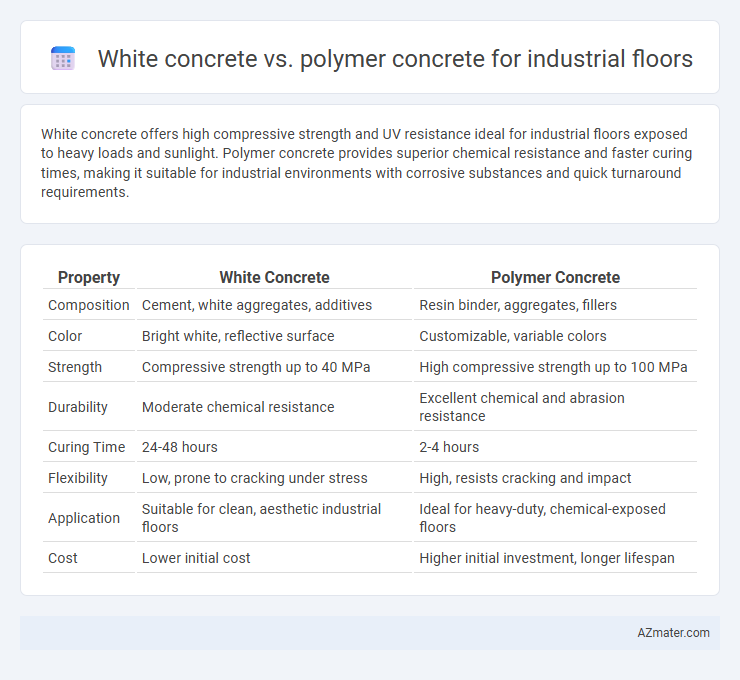White concrete offers high compressive strength and UV resistance ideal for industrial floors exposed to heavy loads and sunlight. Polymer concrete provides superior chemical resistance and faster curing times, making it suitable for industrial environments with corrosive substances and quick turnaround requirements.
Table of Comparison
| Property | White Concrete | Polymer Concrete |
|---|---|---|
| Composition | Cement, white aggregates, additives | Resin binder, aggregates, fillers |
| Color | Bright white, reflective surface | Customizable, variable colors |
| Strength | Compressive strength up to 40 MPa | High compressive strength up to 100 MPa |
| Durability | Moderate chemical resistance | Excellent chemical and abrasion resistance |
| Curing Time | 24-48 hours | 2-4 hours |
| Flexibility | Low, prone to cracking under stress | High, resists cracking and impact |
| Application | Suitable for clean, aesthetic industrial floors | Ideal for heavy-duty, chemical-exposed floors |
| Cost | Lower initial cost | Higher initial investment, longer lifespan |
Introduction to Industrial Flooring Materials
Industrial flooring materials primarily include white concrete and polymer concrete, each offering distinct advantages for heavy-duty applications. White concrete provides high compressive strength, excellent abrasion resistance, and a reflective surface that improves lighting and safety in industrial environments. Polymer concrete combines resin binders with aggregates, delivering superior chemical resistance, faster curing times, and enhanced durability against mechanical stresses commonly found in industrial settings.
Overview of White Concrete
White concrete offers a high-strength and aesthetically appealing option for industrial floors, characterized by its use of white Portland cement and light-colored aggregates. This type of concrete provides excellent reflectivity, improving lighting efficiency in large industrial spaces and reducing energy costs. Its durable surface resists abrasion and chemical exposure, making it suitable for heavy-duty industrial environments requiring both functionality and visual appeal.
Overview of Polymer Concrete
Polymer concrete is a composite material made from resin binders combined with aggregates such as quartz, silica, or crushed stone, providing superior chemical resistance and high mechanical strength for industrial flooring. Its fast curing time and excellent adhesion properties make it ideal for environments requiring minimal downtime and enhanced durability under heavy loads and chemical exposure. Compared to white concrete, polymer concrete offers improved resistance to abrasion, corrosion, and stress, making it a preferred choice for demanding industrial floor applications.
Key Material Properties Compared
White concrete offers high compressive strength, excellent abrasion resistance, and superior reflectivity, making it ideal for industrial floors requiring brightness and durability. Polymer concrete provides enhanced chemical resistance, faster curing times, and increased tensile strength due to its resin-based composition, suited for harsh industrial environments. The choice between white and polymer concrete depends on the required balance of durability, chemical exposure, and aesthetic needs in industrial flooring applications.
Durability and Longevity
White concrete offers high compressive strength and excellent resistance to chemical spills, making it suitable for industrial floors exposed to heavy machinery and constant abrasion. Polymer concrete, composed of resin binders and aggregates, provides superior resistance to cracks, thermal shock, and chemical corrosion, significantly enhancing durability and lifespan in harsh environments. Choosing polymer concrete often results in longer-lasting industrial floors with lower maintenance costs due to its enhanced adhesion and flexibility compared to traditional white concrete.
Chemical and Stain Resistance
White concrete offers moderate chemical resistance suitable for light industrial applications but is prone to staining from acids and oils without protective coatings. Polymer concrete exhibits superior chemical and stain resistance due to its resin binder, making it ideal for harsh environments with exposure to aggressive chemicals and heavy spills. The enhanced durability of polymer concrete results in lower maintenance costs and prolonged floor lifespan in industrial settings.
Installation Process and Time
White concrete for industrial floors requires standard mixing, pouring, and curing processes, typically taking 7 to 28 days for full strength development depending on the specific mix and environmental conditions. Polymer concrete, composed of resin binders and aggregates, has a quicker installation process with curing times ranging from a few hours to 24 hours, enabling faster return to service. The faster curing time of polymer concrete significantly reduces downtime in industrial settings, while white concrete demands more extended curing periods and controlled conditions for optimal performance.
Maintenance and Life Cycle Costs
White concrete offers high durability and low maintenance due to its resistance to abrasion and chemical wear, making it cost-effective over a long life cycle for industrial floors. Polymer concrete provides superior chemical resistance and faster curing times, reducing downtime and maintenance frequency, but it often has higher initial material costs. Evaluating total life cycle costs, polymer concrete may yield savings in harsh chemical environments, while white concrete remains economical for general industrial flooring with moderate maintenance needs.
Applications and Performance in Industrial Settings
White concrete offers excellent durability and chemical resistance, making it ideal for cleanroom environments, food processing plants, and pharmaceutical facilities where hygiene and reflectivity are critical. Polymer concrete provides superior mechanical strength and fast curing times, suitable for heavy-duty industrial floors subjected to high impact, abrasion, and corrosive chemicals, such as warehouses and manufacturing plants. Both materials enhance industrial floor longevity, but polymer concrete excels in environments demanding rapid installation and enhanced load-bearing capacity.
Choosing the Best Option for Your Industrial Floor
White concrete offers superior durability and resistance to heavy industrial loads, making it ideal for high-traffic factory floors requiring hygiene and chemical resistance. Polymer concrete provides enhanced flexibility, rapid curing times, and excellent chemical resistance, which suits environments needing quick turnaround and exposure to corrosive substances. Selecting the best option depends on specific industrial requirements such as load capacity, exposure to chemicals, curing time constraints, and maintenance considerations.

Infographic: White concrete vs Polymer concrete for Industrial floor
 azmater.com
azmater.com